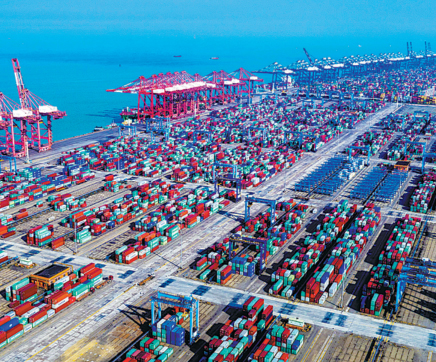Region continues to drive development, opening-up
The construction of the Fuling Food Industrial Park, a joint venture between Louis Dreyfus Company, Donlink Group and Haid Group, officially started in Nansha district, Guangzhou in Guangdong province back in March. With an investment of 7 billion yuan ($101 million), the project is one of the largest investment projects of Louis Dreyfus in China.
The first phase of the project covers an area of about 18 hectares and is expected to be completed in 2023. It will include a feed protein mill with a daily soybean processing capacity of 6,000 metric tons, a vegetable oil refining mill with a daily output of 1,200 tons and a packaged cooking oil production line with a daily bottling capacity of 800 tons.
Wang Dazhong, director of the greenfield project at LDC's North Asia branch, said Guangzhou has always been a main driver of China's continued opening-up and economic growth.
The city's position as China's leading trade center and port, and its business opportunities due to the development of the Guangdong-Hong Kong-Macao Greater Bay Area and the Belt and Road Initiative, together with its excellent infrastructure, diversified talent structure and good business environment are among the major factors that have lured industrial leaders including China's top 500 companies as well as Fortune Global 500 companies to invest.
LDC, one of the world's leading grain and food traders, is diversifying downstream of the value chain, developing more high value-added products and strengthening investment in innovation and technology.

Nansha Port in Guangzhou, Guangdong province. CHINA DAILY
"Many outstanding enterprises have invested in Guangzhou and the city has a fast-growing consumer base in China, which is an important benefit for us to find partners, increase investment and expand the market," Wang said. "After an in-depth inspection of Guangzhou, we found Nansha's core position in the development of Guangzhou and the Guangdong-Hong Kong-Macao Greater Bay Area. Nansha has significant logistical advantages thanks to its well-developed port and road network."
"One of the future positionings of our food industrial park is to become a storage and distribution center for imported grain, so Nansha's unique advantages in this regard also contributed to our decision to settle here," he added.
"In the future, we hope to build an integrated industrial park covering multiple business fields such as feed protein processing, high-tech ecological aquaculture, grain trade and food innovation. Taking good advantage of the convenient transportation, we will set up a storage and distribution center for imported grains, enhance the balance of grain production and sales in the Bay Area and comprehensively ensure the efficient supply of high-quality protein products in southern China to meet the diverse needs of consumers."
He has a very positive attitude toward Guangzhou's advantages in attracting foreign investment.
"The city has significant geographical advantages and is closely connected with Hong Kong and Macao through convenient transportation such as waterways and high-speed rail."
He said his project can get easy access to the Nansha Bridge, which is a major artery of the Bay Area, and the Nansha Port Railway connects the Pearl River Delta with the vast inland areas. "These advantageous conditions have pushed Guangzhou to the forefront of the stage of cooperating with Hong Kong and Macao to connect the world."
Guangzhou's irreplaceable role as an economic center and the hub of China's reform and opening-up, its good business environment, rich human resources, leading technological innovation environment, high-quality infrastructure and strong support combined stand out in its appeal to foreign investors, he said. And its huge business opportunities and development potential will help Guangzhou continue to thrive as a hot spot for foreign investment.



 Print
Print Mail
Mail

